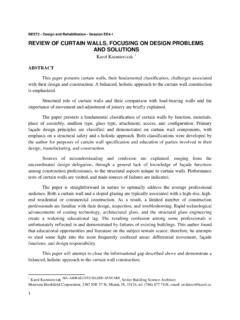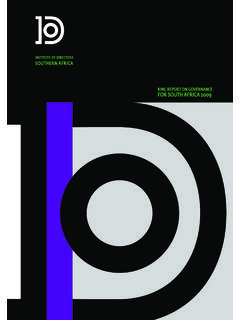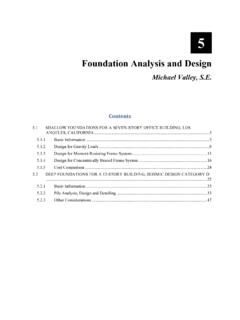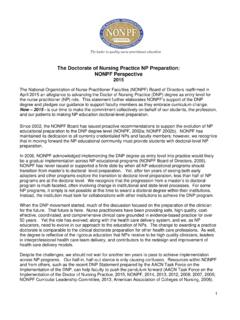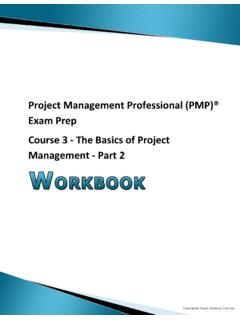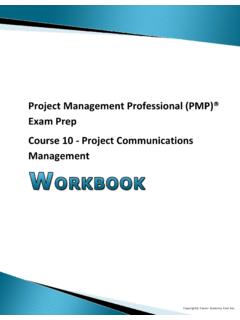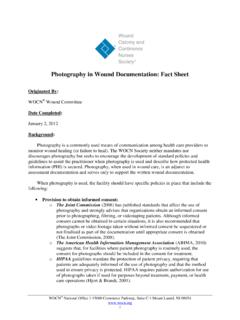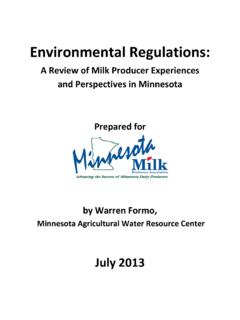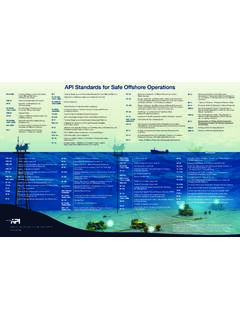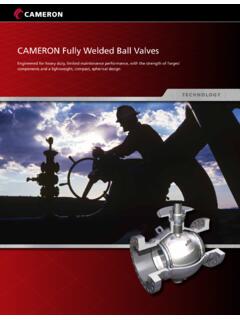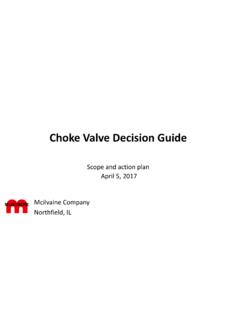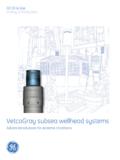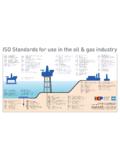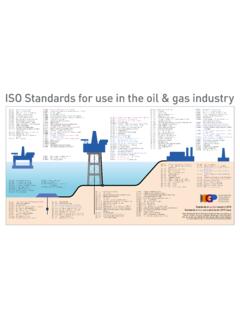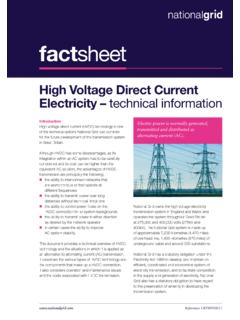Transcription of Valve Qualification Standards and Specifications
1 Valve Qualification Standards and Specifications Presented by Alberto Daglio Introduction - Valve functions and failures Regulations Codes and Specifications Qualification programs Sampling and Qualification ranges The future and one unique spec Valve function and Failures valves are becoming more critical .devices Increase of Pressures and Temperatures Unconventional and extreme environmental conditions Presence of unwanted service constituents (H2S, C02, solids). Chemical injection (Methanol, corrosion inhibitors). Ambitious leakage rates required by Customers (Gas near-zero leakage). Valve Function - Failures modes Failure to Catastrophic Leakage Operate Failure Actuation Valve Atmosphere Bore Wrong position Wrong obturator position Wearing of soft materials Incorrect supply Pressure / Temperature Cavity over pressure Fluid incompatibility pressure Jammed components Corrosion Corrosion of sealing surfaces Increase of torque Cavitation Fittings connections Contact pressure sealing elements Extended piping Wrong evaluation of flow rate Through wall (defects on body/poor quality).
2 Presence or solids These can all lead to Increase of Probability of Failure on Demand (PFD) (minimize it!). Reduction of Mean Time Between Failures (MTBF) (maximize it!). Regulations Codes and Specifications Definitions EN 736 - Part 3. Type Test: carried out on one or more valves representative of the design and the manufacturing process to confirm conformance of the production with specified requirements Production Test: carried out on valves during the manufacturing process to confirm conformance of the production with the specified requirements Acceptance Test: carried out in accordance with the technical Specifications of the order Qualification Standards . The product must pass performance tests and quality assurance tests and meet criteria stipulated in contracts regulations or Specifications .
3 Regulations (Law of the Land). Codes Specifications Qualification programs: common goals Confirm ability to seal against through leakage over a given number of cycles Confirm seals perform at maximum and minimum temperatures Validate Valve operating torque/thrust at ambient, maximum and minimum temp Determine fugitive emission performance at ambient, max. and min. temp Prove environmental containment Prove robustness/stability of metallic trims Prove soft seal combinations Laws of the Land Laws of the Land: by default compliance is required EPA regulations 40 CFR part 60. New fugitive emission regulations sub-part OOOOa for methane New, modified and reconstructed installation must be checked every 6 months. Release of Methane must be below 500 ppm.
4 (Only country in the World as far as I know- that regulates Methane release). BSEE Bureau of Safety and Environmental Enforcement ( Bessie ). subsea valves and Boarding valves must be API17D/6A monogrammed PR2 / 6AV1 (sand). USCG United States Coast Guard (Military). Valve must be Fire Tested to API 607 (and not 6FA that is devoted to 6D/6A). Laws of the Land: by default compliance is required If a pressure vessel is installed in Australia it must be reviewed and certified by an Australian third party for compliance with AS 1210, after it's imported in Australia must be re-hydro tested in the presence of a local accredited inspector. Design rules are same as ASME. CE Mark for top side valves (PED + ATEX + ). The PED provides a series of Essential Safety Requirements that must be met and a series of modules that define the standard of inspection and third party involvement, moreover it may require manufacturer certification (H1).
5 ATEX Certified equipment is designed to prevent the generation of ignition sources such as: Electric sparks, electrostatic discharges, electromagnetic waves, mechanically generated sparks. Laws of the Land: by default compliance is required ABNT NBR 15927. Calls for ASME, API and ISO 10497 (fire test), has a detailed design verification and detailed prototype testing. Performance test should be conducted by performing cycles of opening and closing the Valve on the prototype The opening and closing cycles should be monitored by torque sensors In addition a complete study on design calculations and stress analysis, criteria used for selecting materials. Laws of the Land: by default compliance is required ABNT NBR 15927. Some prototypes can be re used On Ball Valve a sort of stall test is required Laws of the Land: by default compliance is required Most of machinery and industrial equipment, is to be compulsorily certified before being sold in Russia and in the EAC Eurasian Customs Union, they are generally subjected to EAC declaration of conformity regime.
6 Generally, such a declaration is issued according to the technical regulations called TC CU. (this replaces the Gost-R system). As an example TR CU 012/2011 is the EAC certificate, comparable to European ATEX. Codes and Standards Functional Tests API 6D: Specification for Pipeline and Piping valves - 24th Edition (Aug 2014). Annex H/I/J - Supplementary tests, extended FAT and Quality Levels API 6A: Specification for Wellhead and Christmas Tree Equipment - 20th Edition (Oct 2010). Validation testing/Performance Requirement PR1 PR2 (Pressure/ Temperature cycles). Force measurement open/close Dynamic cycling at ambient temperature Maximum/minimum temperature cycling Pressure/temperature cycles Ambient temperature seal test API 6AV1: Specification for Validation of Wellhead Surface Safety valves and Underwater Safety valves for Offshore Service (Feb 2013).
7 Validation classes and sand tests Functional Tests API 17D: Design and Operation of subsea Production Systems subsea Wellhead and Tree equipment (Nov 2011). Validation testing/Performance Requirement (Pressure/ Temperature/Endurance cycles). API 591: Process Valve Qualification Procedure (Feb 2014). Manufacturer and Product Qualifications Test at third party facility is mandatory Fire Test API 6FA: Specification for Fire Testing of valves (Sep 2011). 6D/6A valves exposed to fire. Gives leakage rates API 607: Fire Test for Quarter-turn valves and valves Equipped with Nonmetallic Seats (June 2016). For Soft seated quarter turn valves . Assumed to be more stringent ISO 10497: Testing of valves - Fire type-testing requirements (June 2016). Valve fire test as very similar to API 607.
8 Fugitive Emissions API 622: Type Testing of Process Valve Packing for Fugitive Emission (Oct 2011). Methane emissions test, corrosion test and material properties API 624: Type Testing of Rising Stem valves Equipped with Graphite Packing for Fugitive Emissions . API 622 Packing certificate is required. 97% Methane, Max Leakage 100 ppmv API 641: Type Testing of Quarter-turn valves for Fugitive Emissions (Oct 2016). API 622 Packing certificate is required. 97% Methane, Max Leakage 100 ppmv ISO 15848-1/2: Industrial valves - Measurement, test and Qualification procedures for fugitive emissions . 1 is Type Testing, 2 is Production. (97% Helium or 97% Methane). Define tightness classes depending on type of packing. Measures in flow rate or ppm. Sniffing Method vs Vacuum method.
9 End Users End users Specifications GP 29-01-37 Elastomer and Thermoplastic Selection and Qualification Guidelines for Oil and Gas Production . Acceptance of any pressure-containing assembly is contingent upon successful testing of that final assembly with the seals that are part of that assembly. This testing must be performed at the rated pressure, as a minimum, while at the extremes of the rated temperatures . This is explained as being a reduced version of the PR2, a Qualification Test Program buried in a Soft material spec. (Sections B-2/3 address that, thermal and pressure cycles are required). End users Specifications MESC SPE 77-300 Procedure and technical specification for design validation testing of industrial valves . All Valve Manufacturers must pass Shell EVADOC, Technical Audit and Design Validation Testing (DVT) to be registered on the companies Technically Approved Manufacturer's and Products List [TAMAP].
10 (Previously called Type Approval Test). The TAMAP work is coordinated by Shell Global Solutions at a global level in order to avoid the need for repeating the work on every Valve purchase. End users Specifications MESC SPE 77-300 Procedure and technical specification for design validation testing of industrial valves . Minimum DVT requirements for New manufacturers per Valve type or manufacturing location: Design Evaluation to MESC requirements;. Technical Audit and;. At least one Valve mid-range size in Class 900 & one in Class 2500 successfully passed DVT testing for each Valve type / design to be agreed with Shell. All Valve types identified by the same Technical Classification Code are qualified, provided that the manufacturer confirms identical design.
